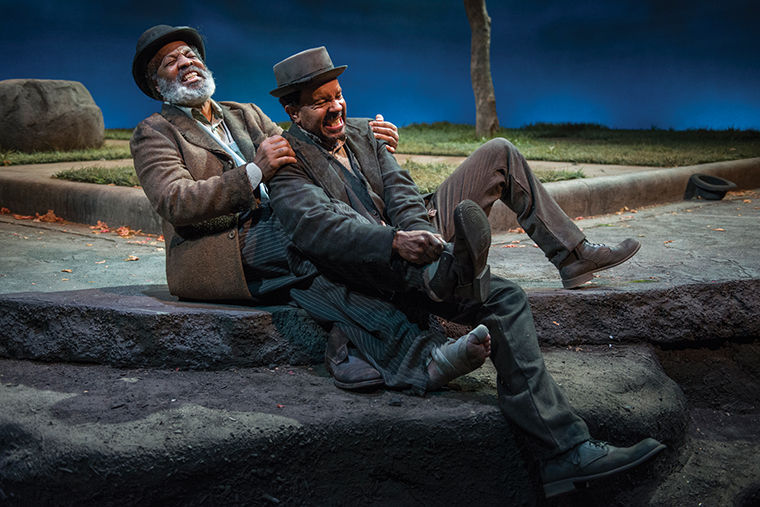‘Waiting for Godot’ show about nothing and everything at once
Photo Courtest of Michael Brosilow
Allen Gilmore and Alfred H. Wilson play Vladimir and Estragon in Ron OJ Parson’s rendition of Samuel Beckett’s “Waiting for Godot” at the Court Theatre, 5545 S. Ellis Ave.
February 2, 2015
“Nothing happens. Nobody comes. Nobody goes.”
The character Estragon in Samuel Beckett’s play is quoted in a way that perfectly sums up the plot of “Waiting for Godot.” While the performances on Jan. 27 in this iconic play at Chicago’s Court Theatre, 5535 S. Ellis Ave., had its minor flaws, those familiar with Beckett’s signature work will understand that this is a statement of fact.
The three-hour play, originally written in 1953, features two men who are waiting for a man named Godot. Director Ron OJ Parson brought his rendition to the Court Theatre using an entirely African-American cast, including Allen Gilmore as Vladimir and Alfred H. Wilson as Estragon.
Spectators may complain that “Waiting for Godot” lacks any action scenes, but when looked at more closely, the performance is full of extraordinary detail and action. For fans of dialogue-driven plays where the action hinges on the constant flow of words rather than song-and-dance numbers, “Waiting for Godot” is paramount. Watching the conversations play out between characters is enjoyable as they escalate from the smallest of small talk to incredibly meaningful discussions about existentialism.
Unlike most other plays that use an abundance of colorful language, “Godot” emphasizes the strength of the quick, snappy rapport. Vladimir and Estragon bounce off each other, and the chemistry between the two actors comes through on stage. “Godot” features an extremely minimalistic set that includes nothing but a dying willow tree and a large rock, with little to no music, save for a sob song by Vladimir. The fast-paced dialogue more than makes up for the lack of spectacle, keeping the audience’s attention throughout the performance.
While the play is enjoyable to watch, the storyline is a bit confusing. The fault does not lie on Parson’s production or the performances, though “Godot” falls into a category known as “Theatre of the Absurd,” which infuses dramatic stories that abandon conventional plot structures to portray personal struggles in a futile world. This is evident in the show’s storyline as Estragon and Vladimir often times contemplate existentialism and suicide in the wake of their unending wait for the unseen Godot.
Gilmore and Wilson’s performances shine in Parson’s rendition of the play. Although the actors’ portrayal of the well-known characters was imperfect at times, both performers brought their own distinct personalities to their respective roles. Even distractions, like a surprise ringing cellphone, crowd interruptions and a premature ovation from the audience, were unable to derail the actors’ performances.
Although the stars turn in strong performances, it is the appearance of Lucky (Anthony Lee Irons) and Pozzo (A.C. Smith), a wealthy man and his servant, that truly steals the show. At the time of their appearance, the duo managed to bring a magnetic energy to the production during a time when the play began to drag. In a show that highlights pairs of characters as a major theme of symbolism, Irons and Smith shine the brightest.
The play’s lack of a clear setting and time period allows the performers to take liberty with their portrayal of the characters. Renditions of Beckett’s plays are known for sticking strictly to the author’s vision, but Parson’s direction added some effective modern touches to the play—from Lucky’s Michael Jackson-like dance moves to Vladimir’s slapstick acting chops.
Parson’s rendition of “Waiting for Godot” turns in a strong showing of the iconic characters theater lovers have long adored. Parson manages to take the iconic “Godot” and keep it entertaining for the modern theatergoer.
Performances of “Waiting for Godot” will show every day except Monday and Tuesday until Feb. 15 at Chicago’s Court Theatre, 5535 S. Ellis Ave. Tickets prices range from $45—$65.








